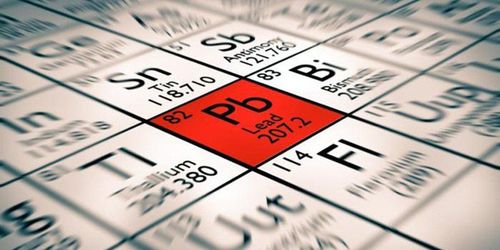This is an automatically translated article.
Lead poisoning is one of the most common heavy metal contamination. Lead poisoning not only affects health but also threatens the life of patients. Lead poisoning can be completely cured with a lead antidote if detected early and treated promptly.
1. Lead poisoning
Lead poisoning is a condition that occurs due to the accumulation of too much lead in the body, which affects health. Lead poisoning usually lasts for several months to several years. Lead poisoning can occur at any age including children.
Currently, there is a fairly common problem in daily life. It is lead poisoning due to overuse of cosmetics. Lead in cosmetics has the effect of increasing the adhesion of products to the skin, and at the same time making the skin smoother when used. Therefore, many cosmetic companies have put lead in cosmetics to increase the effectiveness of use and to gain customer confidence in the product. The long-term use of these cosmetics causes the amount of lead to gradually accumulate in the body, exceeding the permissible dose will lead to poisoning.
Symptoms of lead poisoning in each age group have different characteristics. Specifically:
With infants:
Lead poisoning in infants is mainly caused by children having exposure to lead before birth, leading to the following conditions:
Premature birth, premature babies. Low birth weight at birth. The process of development and growth rate is slower than that of children of the same age. For children, signs of lead poisoning may be encountered such as:
Children are irritable, lethargic, eat poorly, have a loss of appetite, lose weight. Nausea, vomiting with abdominal pain, constipation. Children grow more slowly than usual, sometimes have difficulties in learning. Loss or loss of hearing, convulsions. Possibly Pica syndrome causes cravings for metals, rocks... Heavy metal (lead) contamination in adults:
Increased blood pressure, decreased ability to concentrate. Headache, muscle and joint pain. Some patients may experience emotional disturbances. In particular, in adults, lead poisoning can affect the sexual function of both sexes. The disease reduces sperm count in men, increases the rate of malformed sperm. For women, lead poisoning is one of the causes of miscarriage, stillbirth or premature birth.
2. Lead Antidote
Lead poisoning is one of the heavy metal contamination conditions that are dangerous to health and can lead to death if not detected and handled promptly.
In the treatment of lead poisoning, it is important to first find the source of the contamination and eliminate the source of the heavy metal contamination as soon as possible.
Depending on the level of heavy metal contamination and the blood lead concentration index, the choice of treatment method with or without using antidote for lead poisoning.
If the blood lead level is low, just be careful to avoid contact with lead, the disease will be stable.
In case of severe lead poisoning, it is necessary to appoint a lead antidote to quickly restore the patient's health.
Some therapies help detoxify lead:
Chelation therapy:
This is a method of using oral drugs to increase the excretion of lead in the urine. Therapy is indicated for patients with lead poisoning, children with blood lead readings above 45 mcg/dL. Chelation therapy EDTA:
Indicated for patients with lead and mercury poisoning who do not respond to conventional chelation therapy. In this therapy, the doctor will give the patient an active ingredient called EDTA (Ethylenediaminetetraacetic acid) intravenously. When entering the body, EDTA will find and then bind with minerals in the body to form a complex that is eliminated through the urine. This helps to remove toxins and heavy metals from the body. EDTA not only helps to reduce the amount of toxic metals in the body, remove excess calcium, but also slow down the process of atherosclerosis and reduce the risk of thrombosis. Some other antidotes for lead poisoning:
Disodium calcium edetat:
An injectable lead antidote, including a 10% topical cream. When injected into the body, the drug forms a complex with lead and then excreted in the urine. Thereby reducing the concentration of lead in the blood, and at the same time having the ability to inactivate the ionic activity of lead, making lead completely lose its toxicity. Clinical trials have shown that injecting 1g of the drug into a vein removes 3 to 5mg of lead. Patient had no abdominal pain after 2 hours of treatment. Indications for drug use in cases of lead contamination. Contraindicated in patients with kidney disease, oliguria, dysuria and hepatitis. Dimercaprol :
As an aid to disodium calcium edetat in lead detoxification. The drug should be used as soon as possible. The detoxification mechanism is based on the effect of forming a complex with lead, releasing the SH group and then excreted in the urine. Prescribe drugs for patients with lead, mercury, gold and arsenic poisoning. Contraindications: Patients with liver failure, deficiency of the enzyme gluco-6-phosphate dehydrogen. Penicilamin:
Penicilamin is also an antidote to lead through the mechanism of soluble complex with lead and then excreted in the urine as disulfite. The drug is well absorbed from the gastrointestinal tract, so it is often used in oral form. The best time is to take the medicine on an empty stomach. Indications for the treatment of lead poisoning. Contraindicated for pregnant women, people allergic to any ingredient of the drug and patients with lupus erythematosus. In general, lead poisoning should not be taken lightly because lead poisoning can also be a cause of death if not treated properly and at the right time. Lead antidotes also come in different varieties, the above are to mention some of the commonly used drugs. Contact a specialist immediately if you have signs of suspected heavy metal contamination.
Please dial HOTLINE for more information or register for an appointment HERE. Download MyVinmec app to make appointments faster and to manage your bookings easily.













